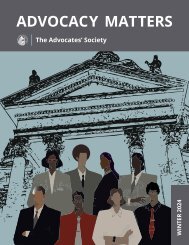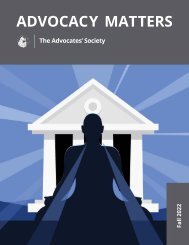Keeping-Tabs-Spring-2023
Stay up-to-date on news and events from our Young Advocates' Standing Committee (YASC) with Keeping Tabs.
Stay up-to-date on news and events from our Young Advocates' Standing Committee (YASC) with Keeping Tabs.
You also want an ePaper? Increase the reach of your titles
YUMPU automatically turns print PDFs into web optimized ePapers that Google loves.
Q.How old were you when you started practice? How did you feel, starting a new career as<br />
a lawyer at that stage in your life?<br />
A. I was 40 when I was called to the bar in 2019. I’d spent most of my career up to that point being the<br />
youngest person in every room, and suddenly I was clerking at the Supreme Court of Canada and was<br />
the oldest of 36 clerks in my year.<br />
Although I’d been working around the law for a long time, it was tough starting out in practice after so<br />
long in one place. I went from being an expert in a very niche field to an advocate who must constantly<br />
learn about different areas of the law and the diverse industries that my clients operate in.<br />
Q. Because we clerked together, I know you had some unique perspectives on the role of an<br />
advocate and what constitutes good advocacy based on your past experiences. Could you<br />
give some insight into those views and how they have evolved because of practice?<br />
A. One of the things I learned from Joe Arvay is that you’re always advocating on (at least) two levels. Of<br />
course, you need to provide the court with a viable legal path to getting the result you want. But you<br />
also need to persuade the court that your client should win.<br />
I was reminded of this in a recent appeal. The respondent had all sorts of ingenious arguments about<br />
why the court shouldn’t find that they were holding property in trust for our clients. But nowhere did<br />
they explain why their client should win: why their client should get to keep property they didn’t pay for.<br />
In the end, no matter how sophisticated your legal argument, to be a successful advocate you have<br />
to help the court understand your client’s situation and want to do the right thing for them. This sounds<br />
really obvious, but law can be such a technical pursuit that lawyers sometimes lose sight of that.<br />
Q. Were there any benefits or difficulties you faced being a relatively junior lawyer at a later<br />
stage in your life?<br />
A. People often assume I have more experience than I really do. This can be a good thing when you’re<br />
trying to gain your client’s confidence, but when I make a rookie mistake in court I’m unlikely to get a<br />
free pass.<br />
Q. What are some advantages and disadvantages of government work relative to private<br />
practice? Which do you prefer, and why?<br />
A. To be honest, I really miss the oodles of guaranteed vacation time that comes with government<br />
work. The pension is pretty sweet, too. Government jobs are also famously family-friendly.<br />
The other big plus of government work is that you get to work on fascinating things that really aren’t<br />
found anywhere else. The public service does important work that really matters to Canadians, and<br />
lawyers (and former lawyers) play a huge part of that.<br />
On the other hand, as a government lawyer you can’t choose or fire your client, and you’re often far<br />
removed from the people who make the big decisions that you’re asked to defend. Private practice<br />
definitely comes with a grind, but in my experience it has felt easier on the conscience too.<br />
16 17

















